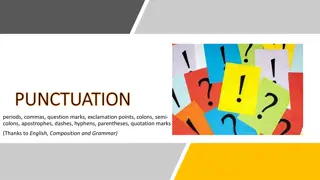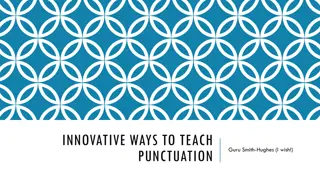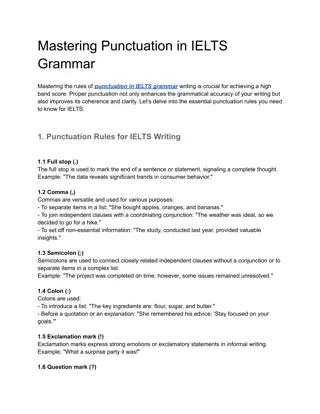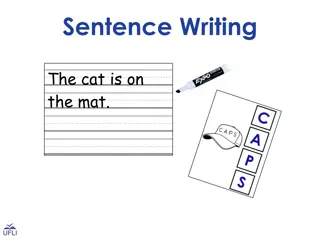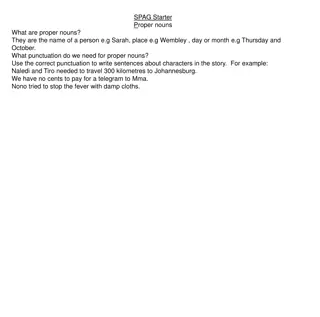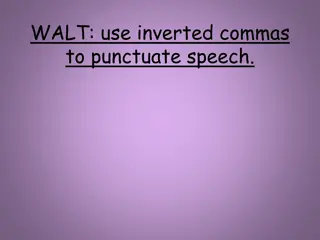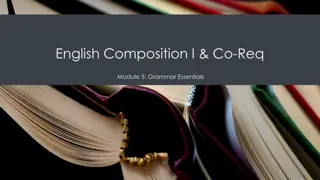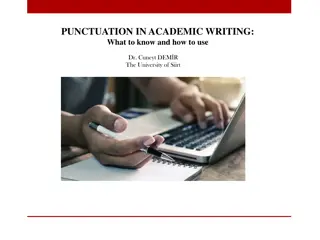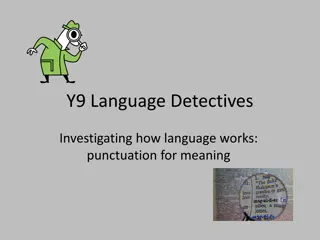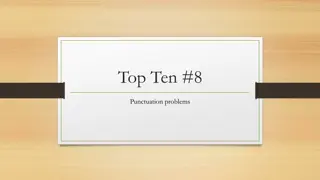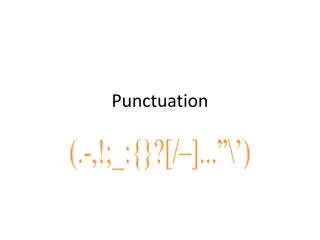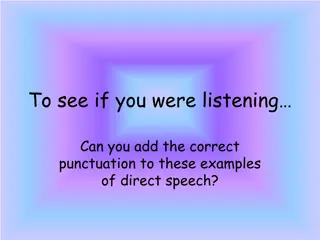Mastering Punctuation for Effective Academic Writing
Ensure accuracy and clarity in academic writing by understanding and correctly applying punctuation rules. Learn about the importance of punctuation marks, including full stops, question marks, exclamation marks, commas, and their proper usage in different contexts to enhance the organization and coherence of your writing.
Download Presentation

Please find below an Image/Link to download the presentation.
The content on the website is provided AS IS for your information and personal use only. It may not be sold, licensed, or shared on other websites without obtaining consent from the author. Download presentation by click this link. If you encounter any issues during the download, it is possible that the publisher has removed the file from their server.
E N D
Presentation Transcript
English Language Assistant Prof. Dr. Ahmed A. Mohammed Ph.D. Immunoparasitology University of Salford International-Manchester, UK
Academic Writing Good academic writing should be accurate. You need to clearly express its contents and always check for: Punctuation. Spelling. Grammar (verb tenses, agreement, etc.)
Punctuation Punctuation marks an important tool of organization. They are symbols used to: 1. organize the structure of written language, and 2. to indicate intonation (rise and fall/or speech pattern) and pauses to be observed when reading aloud. *Punctuation marks are also used to avoid ambiguity (vagueness). For example: woman, without her man, is nothing it has a different meaning from woman: without her, man is nothing
Summary of punctuation rules End punctuation marks: 1. Full stop , or period (.) Used at the end of a sentence: She stood up and went away. She was angry. Used for abbreviations: Co. = (Company) M. P. = (Member of Parliament) 2. Question marks (?) Question marks are used at the end of direct questions: Where do you live? Did you do the homework?
Use a question mark at the end of tag questions: You will help me, won t you? He likes football, doesn t he? 3. Exclamation marks (!) Used to indicate strong emotions: She s so beautiful! What a nice man! How interesting! Used after interjections: Oh! It s awful. Ops! What s up?
Other punctuation marks: Commas (,) Commas are used between items in a series or list. The last two items of the series usually do not need a comma between them, they are separated by (and): I like spaghetti, fish, pizza and Kentucky. Commas are also used between adjectives or adverbs: I'd like to have a big, black, German car. She speaks slowly, quietly and fluently. After the street address and city in an address: 34 Hassan II Street, Rabat, Morocco.
Before or after direct speech: He said, I hate being treated like that. I msorry , she replied. Before a coordinating conjunction (for, and, nor, but, or, yet, so): He woke up late, so he had to drive to work. However, overuse of commas can slow down the reader, and these are some examples of necessary comma usage: However, more cases should be considered before reaching a conclusion. Certain crops, for instance wheat, are susceptible to diseases. Three hundred people were interviewed, but only half the responses could be used.
Semicolons (;) They are used to show the link between two connected phrases, when a comma would be too weak and a full stop too strong: They woke up early; then they went jogging. Use a semicolon to separate items in a series when those items contain punctuation such as a comma: They visited the Eiffel Tower, Paris; Big Ben, London; and the statue of liberty, New York. Semi-colons are also used to divide up items in a list when they have a complex structure, as in a multiple citation:
(Maitland, 2006; Rosenor, 1997; New Scientist, 2006b; University of Michigan, 2000). Colons (:) Use a colon to introduce a list: He visited three cities last summer holiday: Madrid, Roma and Athens. To introduce an idea or an explanation: He had one idea in his mind: to see her as soon as possible.
Colons (:) Use a colon to introduce a list: He visited three cities last summer holiday: Madrid, Roma and Athens. To introduce an idea or an explanation: He had one idea in his mind: to see her as soon as possible. To introduce direct speech or a quotation: The secretary whispered in his ear: Your wife is on the phone.
Apostrophes () These are one of the most misused features of English punctuation. They are mainly used in two situations: Use an apostrophe to indicate a missing letter or letters in a contraction: I m fed up with his stories He s the leading authority (Note: contractions are not common in academic English) Use an apostrophe plus the letter s to show possession: My sister s friend is such a sweet girl.
Quotation marks (/) Single quotation marks used to emphasise a word: The word factory was first used in the seventeenth century. -Double quotation marks used to give quotations from other writers (to quote speech, sentences or words): She said, I love you. Capitalization rules Capitalization is the writing of a word with the first letter as upper-case letter (A, B, C, D,...) and the rest of the word as lower-case letters (a, b, c, d,...)
Summary of the capitalization rules Capitalize the first word in a sentence: They arrived late. They had dinner and went to sleep. The first word in a quote: He said, You are fantastic. Capitalize I : I'm very sorry for being late. I missed the bus. Capitalize proper nouns: George was furious when he heard the bad news from Alice.
Capitalize names of rivers, mountains: The Nile River is in Egypt. The highest mountain in the world is Mount Everest. Capitalize names of organisations: University of Salford-Manchester Nationality words: British, French, German etc The official title of a person (the initials of someone's name) are capitalized: Dr. Mohammed (Doctor) W. Shakespeare (William Shakespeare) is a wonderful novelist
Capitalize countries, cities, languages, nationalities: New York is more exciting than Seattle. He lives in London, but he s not English. He s Iraqi. He speaks English, French in addition to Arabic. Days of the week, months of the year, holidays are capitalized: We went to Paris on Monday and came back on Saturday. The Independence Day is in July not January.
Writing tips Good writers usually use plain English words. So, your sentences should be simple, clear and well structured. When writing, remember recommendations in mind: the following Use simple language. Use simple and clear sentences. you may use subordinate clauses but keep them short. avoid slang language.
Write well structured paragraphs using: -Topic sentences. -Supporting details. -A concluding sentence.


